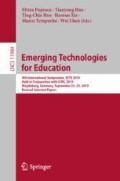Abstract
This paper is a detailed account of the application of parallel corpus to the teaching of style and translation. Facilitated by corpus tools, a quantitative and qualitative comparative analysis of the translation of narrative markers, a key style of Chinese full-length vernacular fictions, is thoroughly demonstrated. Through the class learning, students are expected to be aware of the pseudo oral storytelling feature of Chinese vernacular fictions and understand that narrative markers, as crucial narrative devices ensuring the cohesion and coherence of the text and more importantly, reflecting the style of the genre, require proper rendition in translation. It concludes that the introduction of parallel corpus to Style and Translation class obtains positive effects. On the one hand, parallel corpus provides abundant authentic bilingual data for observation; on the other hand, convenient searching tools help sort out the desired data in an accurate and swift manner, thus facilitate class demonstration and discussion.
Access this chapter
Tax calculation will be finalised at checkout
Purchases are for personal use only
References
Liu, Z.Q., Tian, L., Liu, C.P.: The compilation of Hong Lou Meng Chinese-English parallel corpus (
 ). Contemp. Linguist. 10(4), 329–339 (2008)
). Contemp. Linguist. 10(4), 329–339 (2008)Zhao, H.H.: The Uneasy Narrator: Chinese Fiction from the Traditional to the Modern. Oxford University Press, Oxford (1995)
Leech, G., Short, M.: Style in Fiction: A Linguistic Introduction to English Fictional Prose, 2nd edn. Pearson Education Limited, Harlow (2007)
Liu, Z.Q., Tian, L.: Narrative markers in Hong Lou Meng and their translations—a corpus-based study (
 ). Foreign Lang. Res. 1, 106–110 (2009)
). Foreign Lang. Res. 1, 106–110 (2009)Chen, P.Y.: The Conversion of Narrative Patterns of Chinese Novels (

 ). Shanghai People’s Publisher, Shanghai (1988)
). Shanghai People’s Publisher, Shanghai (1988)Yu, X.H.: Research on the Classical Vernacular Fictions (
 ). Anhui People Press, Hefei (2005)
). Anhui People Press, Hefei (2005)Plaks, A.H.: Chinese Narrative. Peking University Press, Beijing (1995)
Acknowledgements
The work was substantially supported by The National Social Science Fund of China (Project No. 19BYY125).
Author information
Authors and Affiliations
Corresponding author
Editor information
Editors and Affiliations
Rights and permissions
Copyright information
© 2020 Springer Nature Switzerland AG
About this paper
Cite this paper
Tian, L. (2020). Application of Parallel Corpus to Teaching Style and Translation. In: Popescu, E., Hao, T., Hsu, TC., Xie, H., Temperini, M., Chen, W. (eds) Emerging Technologies for Education. SETE 2019. Lecture Notes in Computer Science(), vol 11984. Springer, Cham. https://doi.org/10.1007/978-3-030-38778-5_26
Download citation
DOI: https://doi.org/10.1007/978-3-030-38778-5_26
Published:
Publisher Name: Springer, Cham
Print ISBN: 978-3-030-38777-8
Online ISBN: 978-3-030-38778-5
eBook Packages: Computer ScienceComputer Science (R0)


 ). Contemp. Linguist. 10(4), 329–339 (2008)
). Contemp. Linguist. 10(4), 329–339 (2008) ). Foreign Lang. Res. 1, 106–110 (2009)
). Foreign Lang. Res. 1, 106–110 (2009)
 ). Shanghai People’s Publisher, Shanghai (1988)
). Shanghai People’s Publisher, Shanghai (1988) ). Anhui People Press, Hefei (2005)
). Anhui People Press, Hefei (2005)